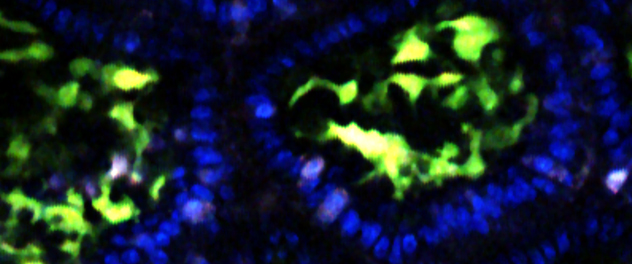-

Shaping the immune system in early life
Dr. Knoop's research team in the Early Life Immune Responses Lab at Mayo Clinic has found that interactions between the immune system and developing microbiota in the intestine can have profound impacts throughout life.
-

Exploring the origins of mucosal immunology
The Early Life Immune Responses Lab at Mayo Clinic is dedicated to education and support of researchers interested in developing host microbiota relationships.
-

Understanding the infant microbiota
The Early Life Immune Responses Laboratory of Kathryn A. Knoop, Ph.D., at Mayo Clinic explores how the gut microbiota develops in concert with the immune system following birth.
Overview
The Early Life Immune Responses Laboratory explores mucosal immunology and how gut-residing bacteria contribute to the development of the immune system. Early life is an important time to establish oral tolerance to proteins from the diet or from the microbiota, and disruption to these processes can result in inflammatory or allergic disorders.
Antigens from the lumen of the intestine are delivered across the intestinal epithelium, processed and presented to the immune system to initiate proper immune responses. We've determined that different phases of antigen delivery during early life are defined and regulated by maternal proteins in breast milk and microbial ligands from the microbiota. Our research focuses on understanding the different downstream immune responses to luminal antigens and oral infections during these unique phases of early life.
Infancy (early life) is an important time for the development of immune responses that provide tolerance and acceptance of the establishing intestinal microbiota. In turn, the microbiota is necessary for the development of the immune system and prevents allergic and inflammatory disorders later in life. However, it is unclear why such tolerance is established best during early life and how the microbiota confers an effect on the immune system.
The Early Life Immune Responses Lab explores mucosal immunology and how gut-residing bacteria contribute to the development of the immune system. Specifically, we have found that epidermal growth factor present in breast milk during the first weeks of life provides strong protection to the child by inhibiting bacterial translocation from the lumen of the intestine to the child's system. Disruption of epidermal growth factor has important implications to the development of enteric infections that can result in bloodstream infections, such as neonatal sepsis. Also, disruption of epidermal growth factor may prevent the development of tolerogenic responses to the intestinal microbiota or dietary antigens later in life. This work has important implications in the intestinal health of newborns and older children throughout life.